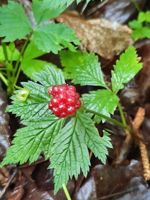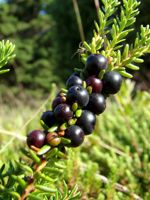Mon-Fri 9am - 5pm Mountain time
Dewberry (Dwarf Raspberry) vs Black Crowberry
Rubus pubescens
Empetrum nigrum
CUSTOM GROW
Dewberry (Rubus pubescens) is a native, low-growing perennial that spreads by creeping stems to form a natural groundcover. In spring, it bears small white flowers that attract pollinators, followed by bright red edible berries resembling tiny raspberries. They are an important food source for birds and mammals.
Widespread across Canada, Dewberry serves as a larval host plant for butterflies such as the Spring Azure (Celastrina ladon), adding to its ecological value. It is a suitable choice for naturalization, pollinator gardens, habitat plantings, and ecological restoration projects.
Black Crowberry is a native evergreen shrub that forms low, spreading mats. It has unique foliage that spirals around the stem, and small dark berries, giving it visual appeal. The berries are edible, but can be acidic, so they are not generally eaten fresh. In colder climates, the berries develop a sweet-tart flavor and are often dried or used in desserts, jams, and jellies.
This hardy shrub provides food for birds and mammals, while its flowers attract pollinators such as bees. It also serves as a host plant for certain butterflies and moths. Together, these roles make it a key contributor to the health of tundra and boreal ecosystems.
In Newfoundland and Labrador, the berries are known locally as ‘blackberries’ and are enjoyed in jams, jellies, and traditional baked goods such as buns and puddings. In Scandinavia, they continue to be used in liqueurs, wines, and juices.

